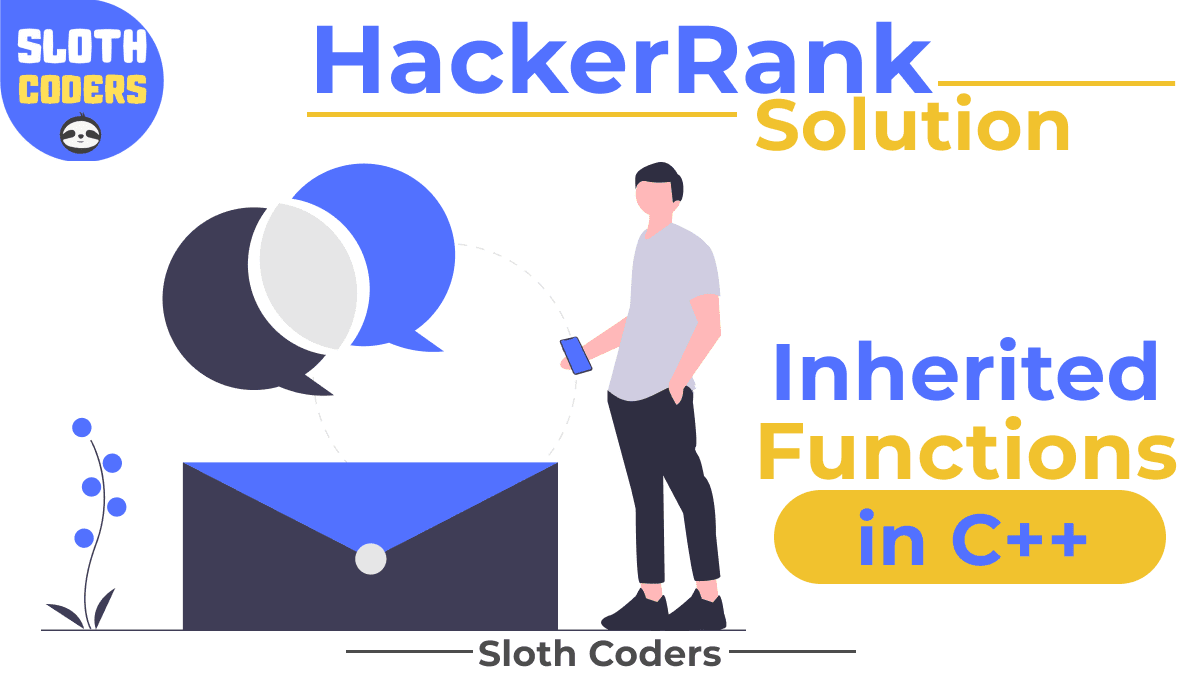Hello there, today we are going to solve Accessing Inherited Functions Hacker Rank Solution in C++.
Table Of Contents 👊Problem
You are given three classes A, B and C. All three classes implement their own version of func.
In class A, func multiplies the value passed as a parameter by 2:
class A
{
public:
A(){
callA = 0;
}
private:
int callA;
void inc(){
callA++;
}
protected:
void func(int & a)
{
a = a * 2;
inc();
}
public:
int getA(){
return callA;
}
};
In class B, func multiplies the value passed as a parameter by 3:
class B
{
public:
B(){
callB = 0;
}
private:
int callB;
void inc(){
callB++;
}
protected:
void func(int & a)
{
a = a * 3;
inc();
}
public:
int getB(){
return callB;
}
};
In class C, func multiplies the value passed as a parameter by 5:
class C
{
public:
C(){
callC = 0;
}
private:
int callC;
void inc(){
callC++;
}
protected:
void func(int & a)
{
a = a * 5;
inc();
}
public:
int getC(){
return callC;
}
};
You are given a class D:
class D
{
int val;
public:
//Initially val is 1
D()
{
val = 1;
}
//Implement this function
void update_val(int new_val)
{
}
//For Checking Purpose
void check(int); //Do not delete this line.
};
You need to modify the class D and implement the function update_val which sets D's val to new_val by manipulating the value by only calling the func defined in classes A, B and C.
It is guaranteed that new_val has only 2, 3 and 5 as its prime factors.
Input Format
Implement class D's function update_val. This function should update D's val only by calling A, B and C's func.
Constraints
1 <= new_val <= 10000
Note: The new_val only has 2, 3 and 5 as its prime factors.
Sample Input
new_val = 30
Sample Output
A's func will be called once.
B's func will be called once.
C's func will be called once.
Explanation
Initially, val = 1.
A's func is called once:
val = val*2
val = 2
B's func is called once:
val = val*3
val = 6
C's func is called once:
val = val*5
val = 30
Solution - Accessing Inherited Functions in C++
#include<iostream>
using namespace std;
class A
{
public:
A(){
callA = 0;
}
private:
int callA;
void inc(){
callA++;
}
protected:
void func(int & a)
{
a = a * 2;
inc();
}
public:
int getA(){
return callA;
}
};
class B
{
public:
B(){
callB = 0;
}
private:
int callB;
void inc(){
callB++;
}
protected:
void func(int & a)
{
a = a * 3;
inc();
}
public:
int getB(){
return callB;
}
};
class C
{
public:
C(){
callC = 0;
}
private:
int callC;
void inc(){
callC++;
}
protected:
void func(int & a)
{
a = a * 5;
inc();
}
public:
int getC(){
return callC;
}
};
class D : public A,B,C
{
int val;
public:
//Initially val is 1
D()
{
val = 1;
}
//Implement this function
void update_val(int new_val)
{
int a = new_val;
while(new_val!=0)
{
if(val==a)
break;
if(new_val%2==0)
{
A::func(val);
new_val/=2;
}
else if(new_val%3==0)
{
B::func(val);
new_val/=3;
}
else if(new_val%5==0)
{
C::func(val);
new_val/=5;
}
}
}
//For Checking Purpose
void check(int); //Do not delete this line.
};
void D::check(int new_val)
{
update_val(new_val);
cout << "Value = " << val << endl << "A's func called " << getA() << " times " << endl << "B's func called " << getB() << " times" << endl << "C's func called " << getC() << " times" << endl;
}
int main()
{
D d;
int new_val;
cin >> new_val;
d.check(new_val);
}
Disclaimer: The above Problem (Accessing Inherited Functions) is generated by Hacker Rank but the Solution is Provided by Sloth Coders. This tutorial is only for Educational and Learning Purpose.
